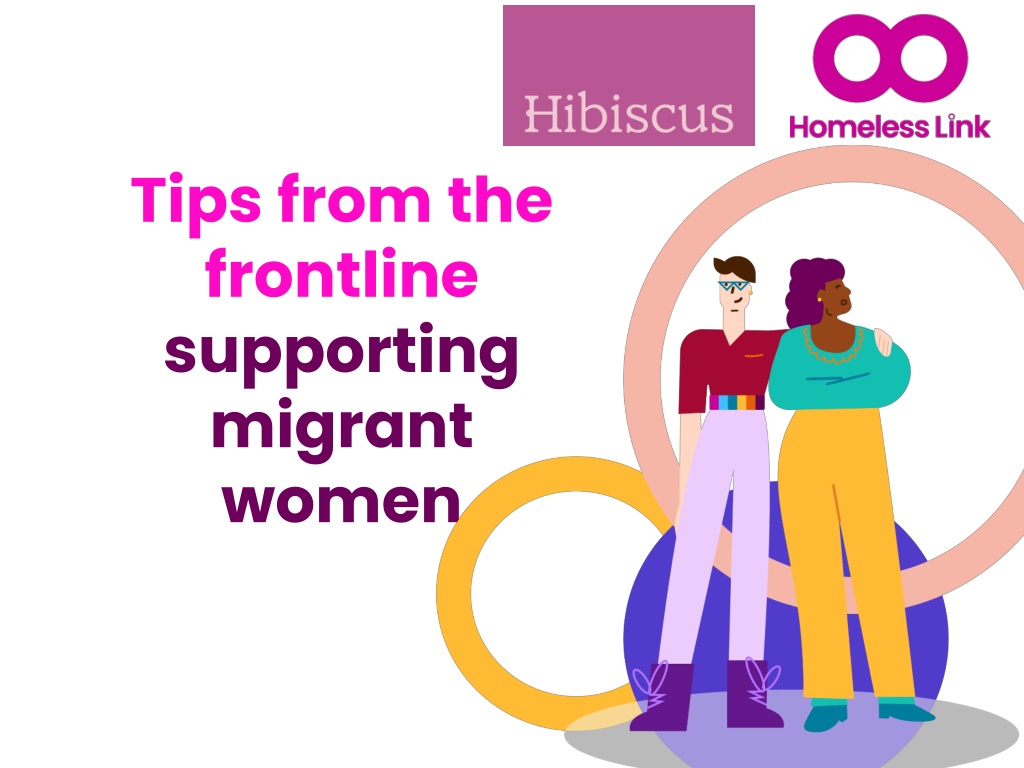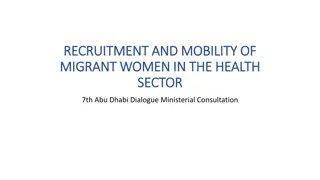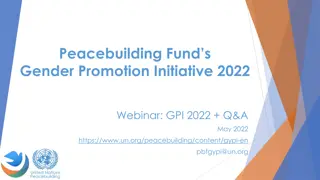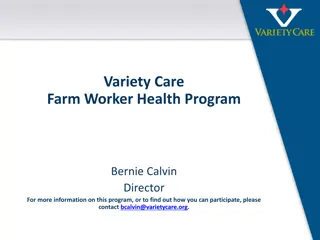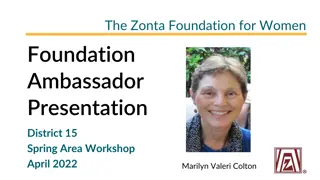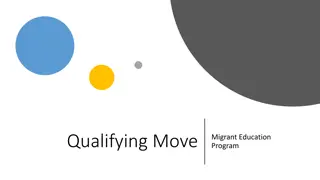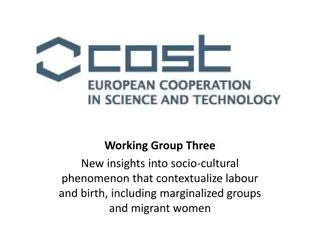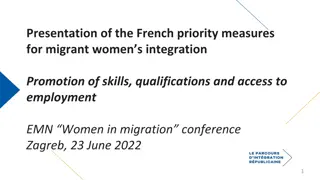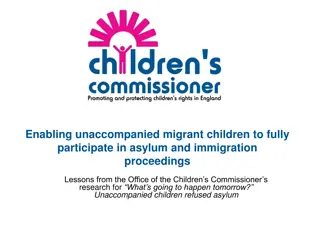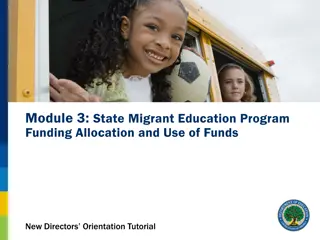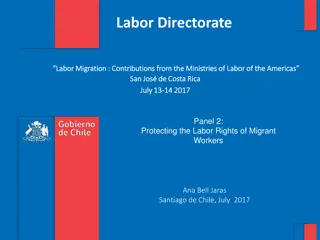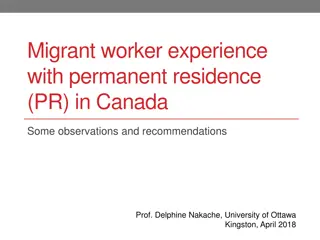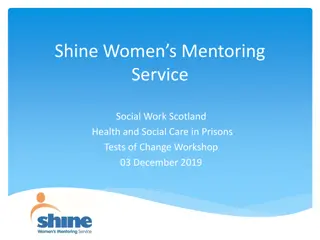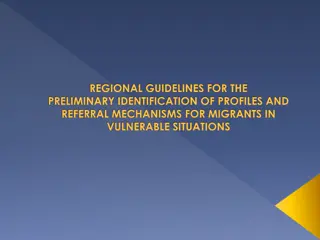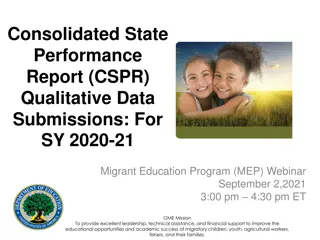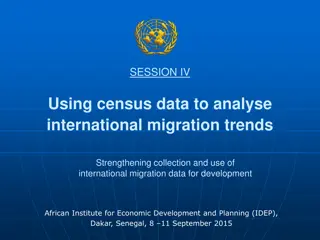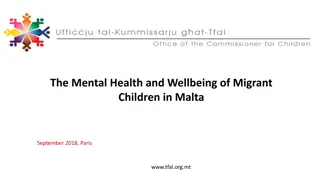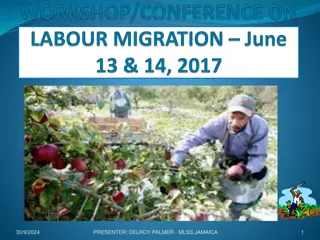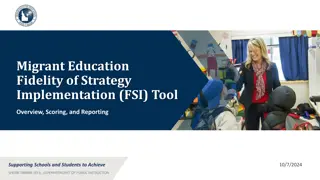Supporting Migrant Women: Challenges and Tips
Migrant women face barriers due to restrictive policies, leading to challenges such as homelessness, language barriers, and lack of access to services. Organizations like Hibiscus work to address these issues, providing support in areas like immigration advice and language translation. Understanding and overcoming hurdles like no recourse to public funds is crucial in assisting migrant women effectively.
Download Presentation

Please find below an Image/Link to download the presentation.
The content on the website is provided AS IS for your information and personal use only. It may not be sold, licensed, or shared on other websites without obtaining consent from the author.If you encounter any issues during the download, it is possible that the publisher has removed the file from their server.
You are allowed to download the files provided on this website for personal or commercial use, subject to the condition that they are used lawfully. All files are the property of their respective owners.
The content on the website is provided AS IS for your information and personal use only. It may not be sold, licensed, or shared on other websites without obtaining consent from the author.
E N D
Presentation Transcript
Tips from the frontline supporting migrant women
Why is it relevant? Migrant women are negatively impacted by policies that restrict certain rights and entitlements. Currently, those with insecure immigration status are prevented from working, renting, driving, accessing health services, and from claiming benefits. This can trigger and impact experiences of homelessness. Migrant women can experience barriers to accessing services: Fear of deportation and detention Risk of destitution and isolation if leaving community Language barriers Lack of cultural understanding Experiences of racism and discrimination
Challenges faced by migrant women Hibiscus are working to improve housing outcomes for migrant women. As part of the safe housing for migrant women project , Hibiscus have identified key challenges faced by migrant women which increase the risk and impact of homelessness. . Language barriers. No recourse to public funds (NRPF). Caring responsibilities for children Challenges to claiming benefits. Poverty and destitution. Physical health needs. Severe and/or complex mental health needs. Insecure immigration status. Complexity of the immigration system. Lack of access to legal aid solicitors. Hibiscus is a London based charity. They enable marginalised migrant women trapped in the immigration and criminal justice systems to rebuild their lives.
Supporting Migrant Women - Tips Immigration advice If the person does not have a clear immigration status and/or is subject to no recourse to public funds, support them to access immigration advice from regulated adviser. Do not provide immigration advice unless regulated Language support Provide access to language translation. A translation service or relevant workers. Understand risk that open communication is limited when using translation service . Advice Service https://www.praxis.org.uk/telephone-advice Praxis: https://www.praxis. org.uk/telephone- advice JCWI: https://www.jcwi.or g.uk/our-helplines Notre Dame Refugee Centre: https://www.notred amerc.org.uk/advice -line NRPF Network: https://www.nrpfnet work.org.uk/ https://www.praxis.org.uk/telephone-advice https://www.praxis.org.uk/telephone-advice https://www.jcwi.org.uk/our-helplines https://www.jcwi.org.uk/our-helplines https://www.notredamerc.org.uk/advice-line https://www.notredamerc.org.uk/advice-line https://www.notredamerc.org.uk/advice-line https://www.nrpfnetwork.org.uk/ https://www.nrpfnetwork.org.uk/
What is no recourse to public funds (NRPF)? A person has NRPF when they are subject to immigration control (section 115 of the Immigration and Asylum Act 1999). If a person is subject to immigration control, they may not be able access public funds including certain benefits. The NRPF network provides lots of information and resources on what it means and what support someone subject to NRPF condition can access: Challenging restricted eligibility due to immigration status (NRPF) If someone is subject to NRPF, this is not a blanket ban. There may still be options to secure housing and financial support for them. Use the web tool developed by the NRPF network to find out what those options might be: Web tool | NRPF Network Support the person to access regulated immigration advice Rights and entitlements | NRPF (nrpfnetwork.org.uk) Rights and entitlements | NRPF (nrpfnetwork.org.uk) Rights and entitlements | NRPF (nrpfnetwork.org.uk)
Equity measures Recognise that migrant women may be less familiar with, and find it harder to navigate local systems, and may need more support to do so. Cultural understanding and awareness Seek to understand how a person s response may be culturally informed. Ask the person and respond to their needs. Attend or procure training on cultural competency/awareness. Provide access to religious items, store them safely and respectfully. Cultural Understanding: Training Ask your local by and for organisations if they have a training offer. Cultural Mediation - Hibiscus Initiatives Hibiscus: Report Cultural Mediation - Hibiscus Initiatives Hibiscus: Training Cultural Mediation Course Hibiscus Initiatives Halo Project: Cultural competency and religious understanding Training (haloproject.org.uk) Cultural Mediation - Hibiscus Initiatives Cultural Mediation Course Hibiscus Initiatives Cultural Mediation Course Hibiscus Initiatives Cultural Mediation Course Hibiscus Initiatives Training (haloproject.org.uk) Training (haloproject.org.uk)
Safety planning Protection from perpetrators/traffickers where applicable Consider risks if a woman has fled a community. Location Be aware of the proximity of the service to amenities Provide a map of local services (foodbank, GP, parks, shops etc) Financial support If developing a new service, factor in a personal budget to be provided to service users Provide for basic needs, including furniture, toiletries, bedding and food.
Further Resources NHAS (for local authorities, public authorities and voluntary agencies): https://www.nhas.org.uk/professionals/nhas-free-training Civil Legal Advice: https://www.gov.uk/civil-legal-advice NRPF Network: https://www.nrpfnetwork.org.uk/ Homeless Link Resources: https://homeless.org.uk/knowledge- hub/unlocking-the-door-a-roadmap-for-supporting-non-uk-nationals- facing-homelessness-in-england/ Migrant Help: Asylum advice and guidance | Migrant Help (migranthelpuk.org) Rights of Women: Rights of Women Refugee and Migrant Centre: What we can help with - Refugee and Migrant Centre (rmcentre.org.uk) East European Resource Centre eerc.org.uk/#/ The Aire Centre (Advice on individual rights in Europe) The AIRE Centre
Next steps Read the full briefing Sign up to training Read other Homeless Link resources
What we do homeless.org.uk Homeless Link is the national membership charity for frontline homelessness services. We work to improve services through research, guidance and learning, and campaign for policy change that will ensure everyone has a place to call home and the support they need to keep it. @HomelessLink
